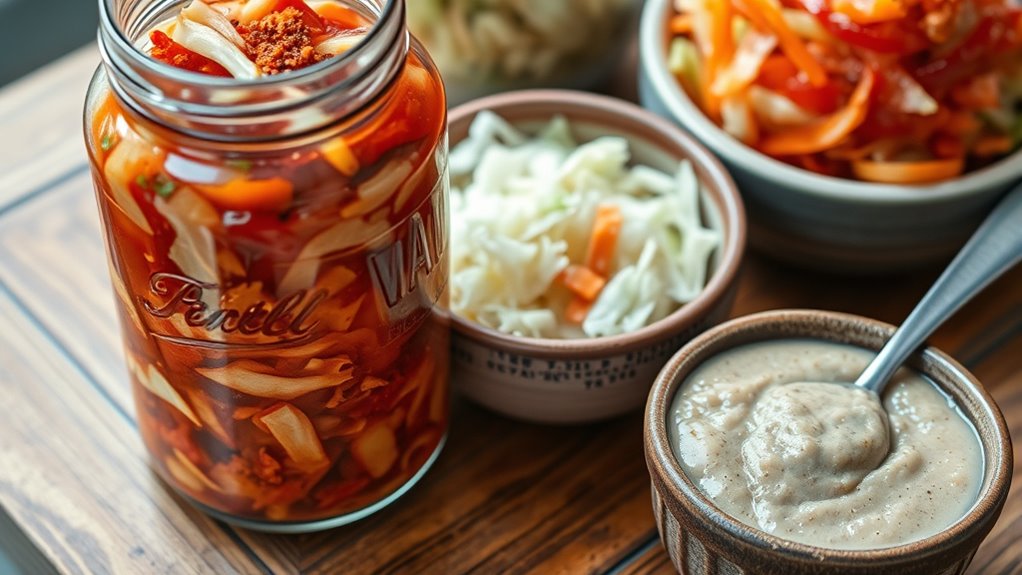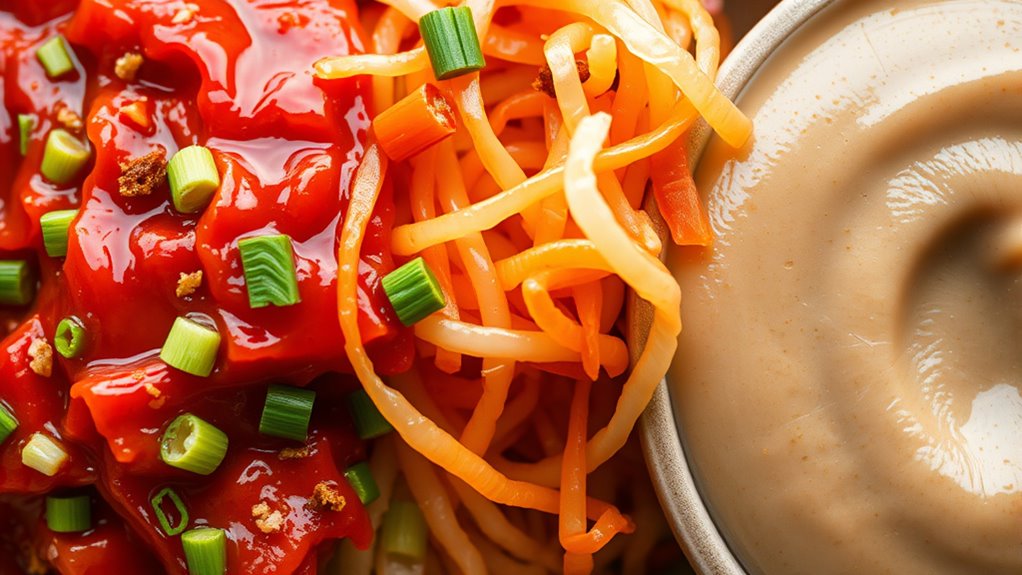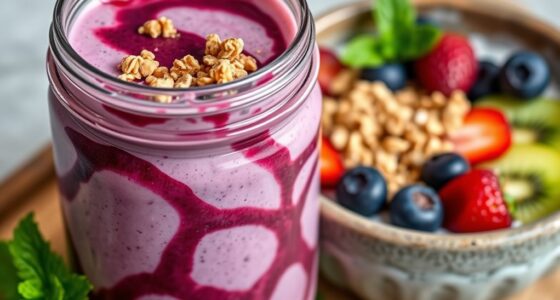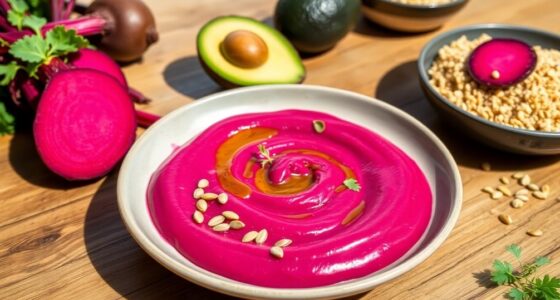Incorporating fermented foods like kimchi, sauerkraut, and miso into your diet can boost your gut health by introducing a variety of beneficial probiotic strains. These foods support digestion, strengthen your immune system, and help restore balance after antibiotics or processed foods. Their diverse bacteria enhance microbiome resilience and overall gut function. Keep exploring how these tasty options can play a key role in maintaining a healthier, happier gut environment.
Key Takeaways
- Kimchi, sauerkraut, and miso are rich sources of diverse probiotics that support digestion and immune health.
- These fermented foods enhance probiotic diversity, helping to maintain a resilient and balanced gut microbiome.
- Regular consumption of kimchi, sauerkraut, and miso improves gut function by reducing bloating, constipation, and indigestion.
- They help restore gut bacteria after antibiotics, strengthening gut barrier and reducing inflammation.
- Incorporating these fermented foods into meals adds flavor while promoting long-term gut health benefits.

Have you ever wondered how fermented foods can boost your gut health? It’s a fascinating topic because these foods aren’t just tasty; they’re packed with beneficial bacteria that support your digestive system. When you include fermented options like kimchi, sauerkraut, and miso in your diet, you’re introducing a variety of probiotics that can enhance probiotic diversity. This diversity is vital because different strains of beneficial bacteria work together to improve your gut environment, making it more resilient and better equipped to handle daily stressors and toxins.
Probiotic diversity plays a significant role in ensuring your digestive benefits. When you consume fermented foods, you’re not just adding a single type of probiotic but a spectrum of strains that can colonize your gut. This variety helps balance your microbiome, which is essential for ideal digestion, nutrient absorption, and immune function. For example, kimchi, a spicy Korean fermented cabbage, contains multiple strains of lactobacilli that can help break down food and reduce harmful bacteria. Sauerkraut, made from fermented cabbage, provides similar benefits with its rich probiotic content, promoting regularity and easing bloating. Miso, a fermented soybean paste, delivers not only probiotics but also enzymes that can aid in digestion and nutrient extraction from your meals.
Consuming fermented foods introduces diverse probiotic strains that support digestion, nutrient absorption, and immune health.
By regularly consuming these fermented foods, you’re actively supporting your gut’s ecosystem. The probiotics they contain can help restore balance if you’ve been taking antibiotics or consuming processed foods that diminish your native bacteria. This restoration improves your digestive health by reducing issues like gas, constipation, and indigestion. additionally, the probiotics in fermented foods can strengthen your gut barrier, preventing harmful substances from entering your bloodstream and reducing inflammation. As a result, your overall digestive function becomes more efficient, and your immune system gets a boost, since a large part of your immune response originates in your gut.
Incorporating fermented foods into your diet doesn’t require much effort, and the benefits are substantial. You’ll notice improvements in how you feel after meals—less discomfort, more regularity, and better nutrient absorption. Plus, these foods can add variety and flavor to your meals, making healthy eating more enjoyable. Remember, the key is consistency; the more regularly you include kimchi, sauerkraut, or miso, the more you’ll support a diverse probiotic community in your gut, leading to sustained digestive benefits. Embrace these flavorful options and give your gut the probiotic diversity it craves for ideal health.
Frequently Asked Questions
Can Fermented Foods Help With Specific Digestive Disorders?
Yes, fermented foods can assist in managing specific digestive disorders by boosting probiotic diversity, which helps restore gut balance. They support digestive health, reduce inflammation, and improve symptoms of conditions like irritable bowel syndrome or diarrhea. Incorporate these foods into your diet regularly to enhance digestive disorder management, but always consult your healthcare provider first to ensure they’re suitable for your specific condition.
Are There Any Risks or Side Effects From Eating Fermented Foods?
Hold your horses, even today’s health enthusiasts face risks with fermented foods. You might experience allergic reactions or worsened symptoms if you have histamine intolerance. Overconsumption can cause bloating, gas, or stomach upset. Always start with small portions to see how your body reacts. If you notice adverse effects, consult your healthcare provider. Remember, moderation and awareness are key to safely enjoying these probiotic-rich foods.
How Much Fermented Food Should I Consume Daily for Gut Health?
You should aim for about one to two servings of fermented foods daily, which generally equals around 1/4 to 1/2 cup. Follow the daily intake guidelines to avoid overdoing it, as excessive consumption might cause digestive discomfort. Listen to your body and gradually increase your fermented food quantities to support gut health without overwhelming your system. Consistency is key for seeing benefits.
Can Fermented Foods Improve Mental Health or Mood?
Did you know that around 90% of your serotonin, the mood-regulating neurotransmitter, is produced in your gut? Fermented foods can boost your gut microbiome, strengthening the brain-gut connection. By supporting healthy gut bacteria, they may help improve your mood and reduce anxiety. So, incorporating fermented foods into your diet could positively influence your mental health, making you feel more balanced and emotionally resilient each day.
Do Homemade Fermented Foods Contain the Same Probiotics as Store-Bought?
Homemade probiotics can contain similar beneficial bacteria as store-bought varieties, but it depends on your fermentation process. When you make fermented foods at home, you control the ingredients and fermentation time, which can influence probiotic content. Store-bought varieties often undergo pasteurization, reducing probiotic levels. To maximize probiotics in homemade foods, guarantee proper fermentation conditions, use fresh ingredients, and avoid pasteurization. This way, you get the full gut health benefits.
Conclusion
By adding fermented foods like kimchi, sauerkraut, and miso to your diet, you’re opening the door to a thriving gut ecosystem. These foods act as your gut’s best friends, boosting beneficial bacteria and helping digestion run smoothly. Think of your gut as a garden—you’re planting seeds of health that grow stronger with each bite. Embrace these tasty allies, and watch your gut flourish like a vibrant, well-tended landscape.









